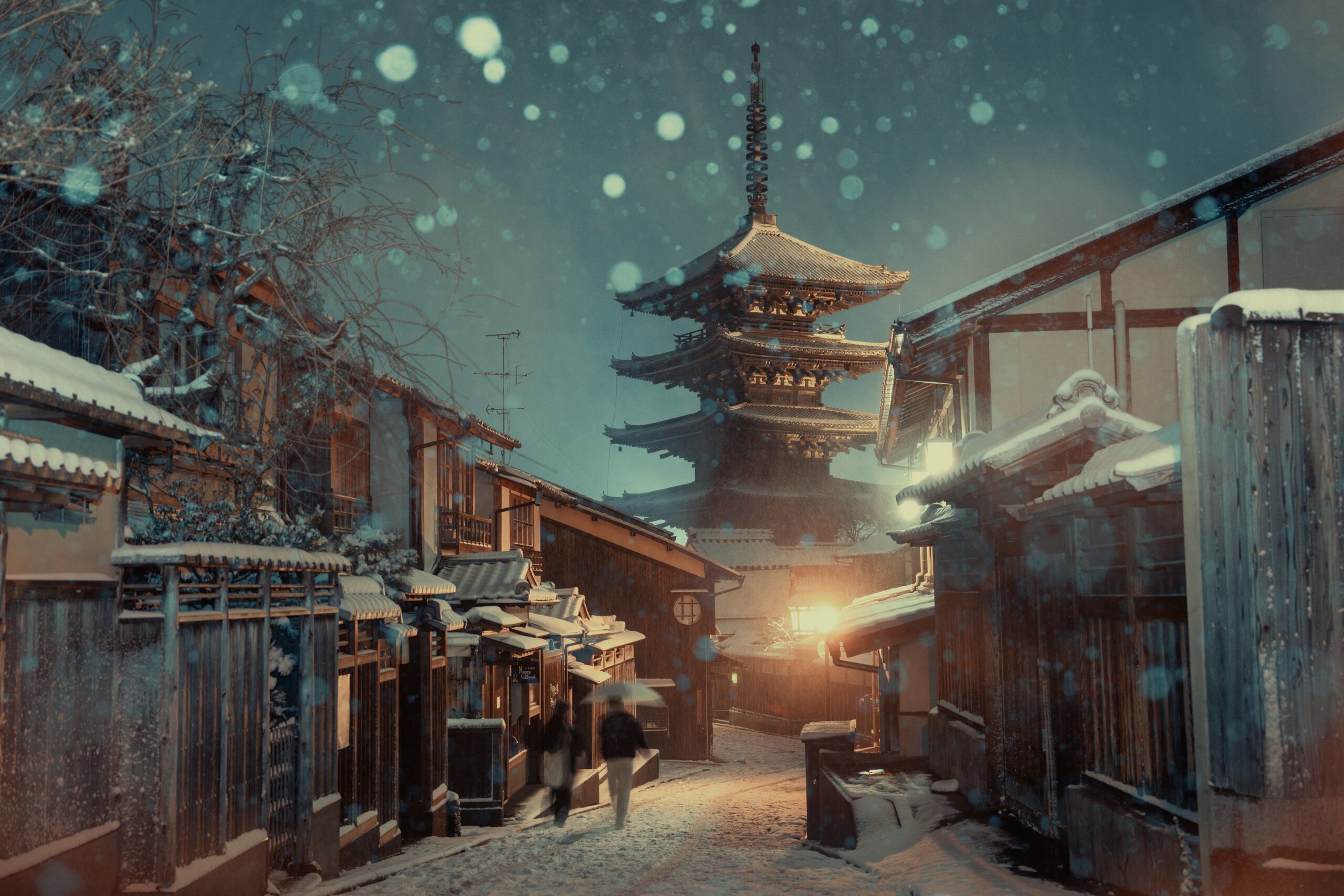The winter season in Japan is a time of natural beauty and quiet reflection, characterized by cool air, snow-covered landscapes, and festive celebrations.
In Japanese names, winter is often reflected in its meanings, which memorialize its purity, stillness, and elegance.
This article presents over 100 Japanese names inspired by winter, perfect for boys, girls, and unisex options, each with detailed explanations of their meanings and significance.
Japanese names related to the winter season are not just labels but also reflections of cultural values, natural beauty, and profound meanings deeply rooted in Japanese tradition.
During winter, when cold winds sweep through the islands and snow blankets the landscape, these names inspire tranquillity and elegance.
Cultural Significance
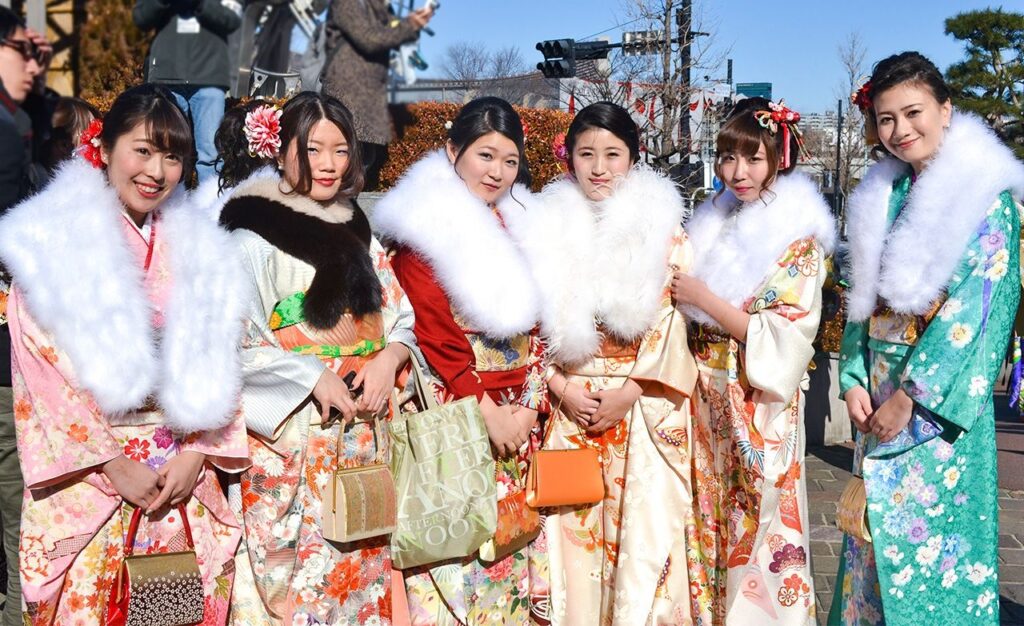
Winter holds a special place in Japanese culture, marked by traditional festivals, seasonal delicacies, and age-old customs.
Names related to this season often draw inspiration from these cultural elements, reflecting themes of celebration, reflection, and familial bonds.
Natural Imagery
It is no surprise that winter’s names are infused with natural images drawn from nature. From the delicate beauty of snowflakes to the resilience of evergreen trees, each name paints a picture of the wondrous sights and sounds of the winter landscape.
Personal Connection
For parents seeking a name for their child, Japanese names related to winter offer a deeply personal connection to the season and its unique characteristics.
Japanese names related to summer season are also great for your newborn baby or nickname.
Whether inspired by a snowy landscape, a winter festival, or a cherished family tradition, these names carry with them a sense of heritage and identity.
In essence, Japanese names related to the winter season are a celebration of nature’s beauty, cultural richness, and the timeless wisdom embedded in Japanese tradition.
With their evocative imagery and profound meanings, these names serve as timeless reminders of the enduring spirit of winter.
Reasons To Choose Japanese Names Related to Winter Season
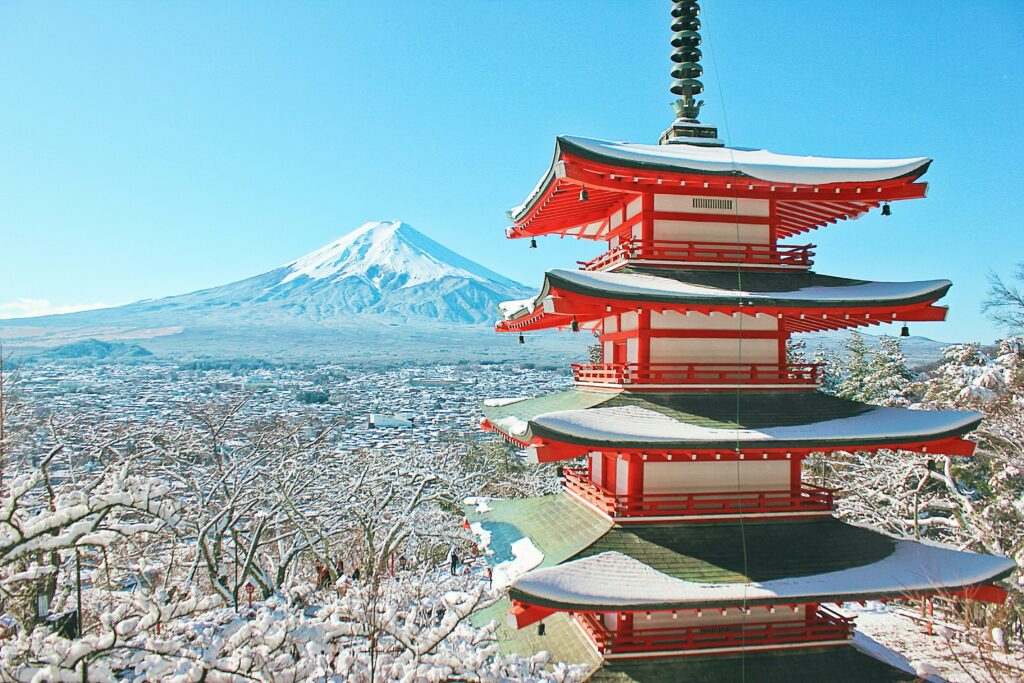
Seasonal Beauty
Winter-inspired names reflect the serene and pristine beauty of the season, capturing the essence of snowy landscapes and crisp, clear days.
Cultural Significance
Choosing a winter-related name honors Japanese traditions and the cultural significance of the season, which includes various festivals and customs.
Unique Meanings
Winter names often have unique and poetic meanings, such as purity, tranquility, and elegance, making them special and memorable.
Symbolism
Winter names can symbolize new beginnings, resilience, and the quiet strength needed to endure the cold season, offering a powerful message.
Nature Connection
These names foster a deep connection with nature, reflecting the beauty and stillness of winter and encouraging an appreciation for the natural world.
Timeless Appeal
Winter names often have a timeless quality, ensuring they remain beautiful and relevant across generations.
Versatility
Many winter-inspired names are unisex, providing versatile options that can be used for any child, regardless of gender.
Reflective Qualities
Names related to winter often evoke a sense of introspection and reflection, resonating with the quiet and contemplative nature of the season.
Poetic Imagery
Winter names conjure poetic images of snowy nights, frosty mornings, and peaceful landscapes, adding a layer of artistic expression to a child’s identity.
Elegance and Grace
The crisp, clean nature of winter is reflected in these names, which often convey elegance and grace, qualities that many parents wish to bestow upon their children.
Connection to Festivals
Winter in Japan is a time for festivals and celebrations, such as New Year’s and the Snow Festival, adding festive significance to these names.
Personal Resonance
For families who have personal memories or connections to winter, choosing a winter-inspired name can be a meaningful tribute to those experiences.
Japanese Names Related to Winter and Their Meanings
Japanese Names Related to Winter for Boys
Here are 40 Japanese names related to the winter season for boys, along with their meanings:
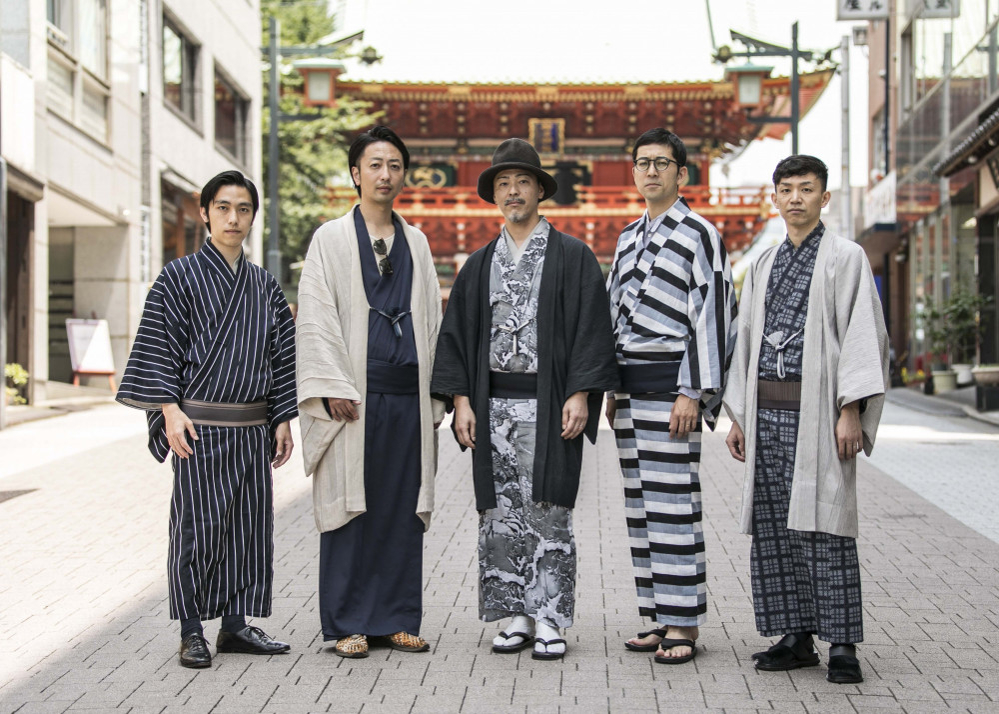
These names capture the essence of winter, evoking imagery of strength, resilience, and tranquility, making them perfect choices for boys born during this serene season.
- Haruki (春樹)
- Meaning: “Spring Tree”
- Significance: Haruki symbolizes the promise of new life and growth, akin to the arrival of spring after winter.
- Yukio (幸雄)
- Meaning: “Snow Boy”
- Significance: Yukio embodies the purity and tranquility of snow, symbolizing serenity and calmness.
- Kaito (海斗)
- Meaning: “Ocean Pioneer”
- Significance: Kaito represents the adventurous spirit and boundless curiosity, akin to exploring the vastness of the ocean.
- Daichi (大地)
- Meaning: “Great Earth”
- Significance: Daichi symbolizes the solid and enduring nature of the earth, reminiscent of the stability and resilience of winter.
- Ren (蓮)
- Meaning: “Lotus”
- Significance: Ren embodies purity and enlightenment, similar to how a lotus flower blooms gracefully amidst the chill of winter.
- Kazuki (和樹)
- Meaning: “Harmonious Tree”
- Significance: Kazuki represents the unity and balance found in nature, akin to the harmony of winter landscapes.
- Yuto (悠斗)
- Meaning: “Distant Pioneer”
- Significance: Yuto symbolizes the sense of exploration and adventure, reminiscent of journeying through the vastness of winter landscapes.
- Sora (空)
- Meaning: “Sky”
- Significance: Sora embodies the vastness and freedom of the sky, akin to the boundless possibilities of winter.
- Akihiko (明彦)
- Meaning: “Bright Prince”
- Significance: Akihiko represents leadership and nobility, akin to the clarity and brightness of winter days.
- Takumi (匠)
- Meaning: “Artisan”
- Significance: Takumi embodies craftsmanship and skill, akin to the intricate beauty found in winter landscapes.
- Yukihiro (幸広)
- Meaning: “Broad Happiness”
- Significance: Yukihiro symbolizes joy and contentment, akin to the warmth and comfort found during winter.
- Ryo (涼)
- Meaning: “Refreshing”
- Significance: Ryo embodies the coolness and freshness of winter, akin to the invigorating breeze that sweeps through the season.
- Renjiro (蓮二郎)
- Meaning: “Second Son of the Lotus”
- Significance: Renjiro represents the strength and resilience of the lotus flower, akin to the perseverance needed to thrive in winter.
- Hikaru (光)
- Meaning: “Light”
- Significance: Hikaru embodies illumination and clarity, akin to the brightness and purity of winter light.
- Kazuma (和馬)
- Meaning: “Harmonious Horse”
- Significance: Kazuma represents unity and strength, akin to the cohesion found in winter communities.
- Yushiro (悠四郎)
- Meaning: “Fourth Son of Distant Pioneering”
- Significance: Yushiro embodies the adventurous spirit and exploration, akin to the journeying through the vastness of winter landscapes.
- Toshiro (俊郎)
- Meaning: “Talented Son”
- Significance: Toshiro represents excellence and skill, akin to the mastery required to navigate winter’s challenges.
- Hayato (隼人)
- Meaning: “Falcon Person”
- Significance: Hayato embodies swiftness and agility, akin to the speed and grace of winter birds in flight.
- Yuma (佑馬)
- Meaning: “Helpful Horse”
- Significance: Yuma represents support and assistance, akin to the solidarity found in winter communities.
- Riku (陸)
- Meaning: “Land”
- Significance: Riku embodies solidity and stability, akin to the firm ground beneath winter’s snow.
- Hiroto (寛人)
- Meaning: “Generous Person”
- Significance: Hiroto represents kindness and compassion, akin to the warmth and generosity shared during winter festivities.
- Taichi (大地)
- Meaning: “Large Earth”
- Significance: Taichi embodies the vastness and endurance of the earth, akin to the steadfastness of winter landscapes.
- Kenta (健太)
- Meaning: “Healthy and Plump”
- Significance: Kenta represents vitality and strength, akin to the robustness of winter wildlife.
- Yuta (雄太)
- Meaning: “Plump and Courageous”
- Significance: Yuta embodies bravery and resilience, akin to the courage needed to face winter’s challenges.
- Satoshi (聡)
- Meaning: “Quick-witted”
- Significance: Satoshi represents intelligence and insight, akin to the sharpness of winter’s air.
- Takashi (孝)
- Meaning: “Filial Piety”
- Significance: Takashi embodies respect and devotion, akin to the familial bonds strengthened during winter gatherings.
- Renzo (蓮三)
- Meaning: “Third Son of the Lotus”
- Significance: Renzo embodies resilience and growth, akin to the lotus flower’s ability to thrive in adversity.
- Kaito (海斗)
- Meaning: “Ocean Pioneer”
- Significance: Kaito represents exploration and adventure, akin to the vastness and mystery of winter seas.
- Yuma (雄磨)
- Meaning: “Masculine Polishing”
- Significance: Yuma embodies strength and refinement, akin to the process of honing one’s skills during the winter months.
- Taiga (大河)
- Meaning: “Big River”
- Significance: Taiga represents the power and majesty of nature, akin to the mighty rivers that flow even in winter.
- Akio (昭夫)
- Meaning: “Bright Man”
- Significance: Akio embodies clarity and warmth, akin to the brightness and comfort of winter sunlight.
- Yoshiro (義郎)
- Meaning: “Righteous Son”
- Significance: Yoshiro embodies integrity and honor, akin to the noble virtues upheld during the winter season.
- Hiroshi (浩)
- Meaning: “Prosperous”
- Significance: Hiroshi represents abundance and success, akin to the bountiful harvests celebrated in winter.
- Shohei (昇平)
- Meaning: “Rising Peace”
- Significance: Shohei embodies harmony and tranquility, akin to the peacefulness found amidst winter’s quietude.
- Shinji (慎二)
- Meaning: “True Second”
- Significance: Shinji represents authenticity and sincerity, akin to the genuine connections forged during winter gatherings.
- Kojiro (浩二郎)
- Meaning: “Prosperous Second Son”
- Significance: Kojiro embodies success and achievement, akin to the milestones reached amidst the challenges of winter.
- Hiroki (大樹)
- Meaning: “Big Tree”
- Significance: Hiroki represents strength and resilience, akin to the sturdy trees that endure winter’s harsh conditions.
- Kenji (健次)
- Meaning: “Healthy and Strong”
- Significance: Kenji embodies vitality and vigor, akin to the robust health enjoyed during the winter season.
- Takao (尊雄)
- Meaning: “Respected Hero”
- Significance: Takao represents honor and valor, akin to the bravery displayed in facing winter’s challenges.
- Ryota (涼太)
- Meaning: “Refreshing and Plump”
- Significance: Ryota embodies coolness and vitality, akin to the rejuvenation experienced in winter’s crisp air.
- Hiroto (浩斗)
- Meaning: “Abundant Constellation”
- Significance: Hiroto represents the vastness and richness of the universe, akin to the expansive skies observed during winter nights.
Japanese Names Related to Winter Season for Girls
Here are 40 Japanese names related to the winter season for girls, along with their meanings:
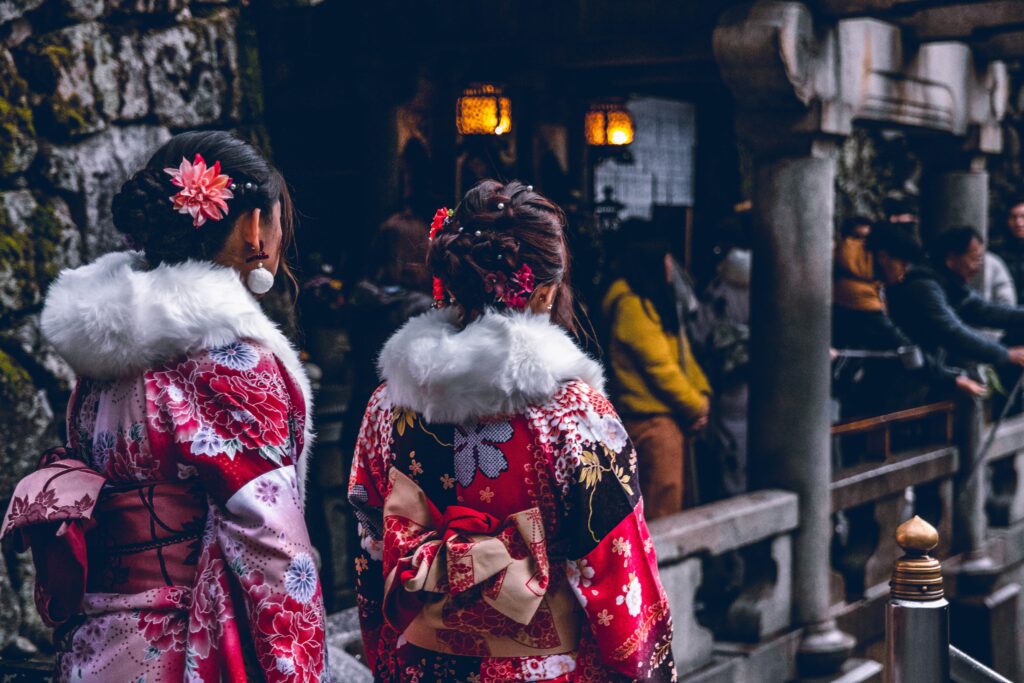
These names reflect the serene, pure, and graceful qualities associated with the winter season, offering beautiful options for girls with meanings that evoke the enchanting essence of winter.
- Yukiko (雪子)
- Meaning: “Snow Child”
- Significance: Yukiko embodies the pure and serene qualities of snow, symbolizing innocence and tranquility.
- Fuyuko (冬子)
- Meaning: “Winter Child”
- Significance: Fuyuko is a charming name that is directly associated with the winter season, representing its calm and quiet nature.
- Haruka (遥)
- Meaning: “Distant”
- Significance: Haruka evokes the vastness and depth of winter landscapes, symbolizing a sense of mystery and wonder.
- Koyuki (小雪)
- Meaning: “Little Snow”
- Significance: Koyuki captures the delicacy and beauty of snowflakes, symbolizing grace and purity.
- Mizuki (瑞希)
- Meaning: “Beautiful Moon”
- Significance: Mizuki reflects the serene beauty of the winter moon, symbolizing elegance and tranquility.
- Yukina (雪奈)
- Meaning: “Snowy Nara”
- Significance: Yukina combines the purity of snow with the charm of Nara, symbolizing grace and charm.
- Nozomi (望)
- Meaning: “Hope”
- Significance: Nozomi represents the hope and anticipation that come with the winter season, symbolizing optimism and aspiration.
- Rika (理香)
- Meaning: “True Fragrance”
- Significance: Rika embodies the subtle and gentle scents associated with winter, symbolizing purity and grace.
- Saki (咲)
- Meaning: “Blossom”
- Significance: Saki symbolizes the beauty and resilience of flowers that bloom even in winter, representing vitality and strength.
- Yukari (雪梨)
- Meaning: “Snow Pear”
- Significance: Yukari combines elements of snow and fruit, symbolizing sweetness and purity.
- Reina (麗奈)
- Meaning: “Graceful”
- Significance: Reina reflects the elegance and poise associated with the winter season, symbolizing beauty and refinement.
- Kanna (環奈)
- Meaning: “Peace”
- Significance: Kanna embodies the tranquility and calmness of winter landscapes, symbolizing serenity and harmony.
- Hana (花)
- Meaning: “Flower”
- Significance: Hana represents the delicate beauty of flowers that bloom even in the coldest seasons, symbolizing resilience and charm.
- Yua (結愛)
- Meaning: “Binding Love”
- Significance: Yua reflects the warmth and affection that bind people together during the cold winter months, symbolizing unity and care.
- Shiori (詩織)
- Meaning: “Poem”
- Significance: Shiori captures the poetic and reflective qualities of winter, symbolizing creativity and introspection.
- Ayaka (彩花)
- Meaning: “Colorful Flower”
- Significance: Ayaka represents the vibrant and diverse beauty of winter flora, symbolizing abundance and diversity.
- Misaki (美咲)
- Meaning: “Beautiful Blossom”
- Significance: Misaki embodies the beauty and grace of blossoms that flourish even in winter, symbolizing elegance and vitality.
- Nanami (七海)
- Meaning: “Seven Seas”
- Significance: Nanami evokes the vastness and depth of winter oceans, symbolizing mystery and exploration.
- Sora (空)
- Meaning: “Sky”
- Significance: Sora reflects the clear and expansive winter skies, symbolizing freedom and openness.
- Rin (凛)
- Meaning: “Dignified”
- Significance: Rin embodies the dignity and strength associated with winter’s stillness, symbolizing resilience and grace.
- Kiyomi (清美)
- Meaning: “Pure Beauty”
- Significance: Kiyomi represents the clarity and purity of winter landscapes, symbolizing untainted beauty.
- Sachiko (幸子)
- Meaning: “Child of Happiness”
- Significance: Sachiko embodies the joy and contentment found in the quiet beauty of winter, symbolizing happiness and cheer.
- Yurika (百合香)
- Meaning: “Lily Fragrance”
- Significance: Yurika reflects the delicate and pure scent of lilies, symbolizing elegance and grace.
- Akari (灯)
- Meaning: “Light”
- Significance: Akari represents the warm and comforting light that illuminates dark winter days, symbolizing hope and guidance.
- Yui (結衣)
- Meaning: “Binding Clothes”
- Significance: Yui symbolizes the connection and unity shared among individuals during the winter season, symbolizing harmony and togetherness.
- Riko (莉子)
- Meaning: “Child of Pear”
- Significance: Riko embodies the purity and sweetness associated with winter fruits, symbolizing innocence and abundance.
- Natsuki (夏希)
- Meaning: “Summer Hope”
- Significance: Natsuki represents the warmth and optimism that emerge even in the coldest
- Airi (愛莉)
- Meaning: “Beloved Jasmine”
- Significance: Airi combines the affection of love with the delicate beauty of jasmine, symbolizing tenderness and grace.
- Yume (夢)
- Meaning: “Dream”
- Significance: Yume captures the dreamy and imaginative nature of winter, symbolizing hope and inspiration.
- Yuriko (百合子)
- Meaning: “Child of Lily”
- Significance: Yuriko embodies the purity and elegance associated with lilies, symbolizing grace and beauty.
- Sakura (桜)
- Meaning: “Cherry Blossom”
- Significance: Sakura represents the fleeting beauty and renewal of life, even in the cold of winter, symbolizing resilience and grace.
- Kanade (奏)
- Meaning: “Playing Music”
- Significance: Kanade embodies the harmonious melodies and peacefulness of winter, symbolizing tranquility and serenity.
- Nao (菜緒)
- Meaning: “Vegetable Cord”
- Significance: Nao symbolizes the nourishment and sustenance provided by winter vegetables, symbolizing health and vitality.
- Yuko (裕子)
- Meaning: “Abundant Child”
- Significance: Yuko represents the richness and abundance found in the depths of winter, symbolizing prosperity and growth.
- Mai (舞)
- Meaning: “Dance”
- Significance: Mai captures the graceful movements of falling snow, symbolizing beauty and elegance.
- Rin (鈴)
- Meaning: “Bell”
- Significance: Rin embodies the delicate chimes of winter bells, symbolizing purity and clarity.
- Aya (彩)
- Meaning: “Color”
- Significance: Aya represents the vibrant hues of winter landscapes, symbolizing beauty and diversity.
- Momo (桃)
- Meaning: “Peach”
- Significance: Momo symbolizes the sweetness and vitality of winter fruits, symbolizing abundance and fertility.
- Hinata (陽向)
- Meaning: “Facing the Sun”
- Significance: Hinata embodies the warmth and positivity of winter sunlight, symbolizing optimism and joy.
- Yukiho (雪穂)
- Meaning: “Snow Ear”
- Significance: Yukiho captures the delicate and unique beauty of snowflakes, symbolizing purity and uniqueness.
Japanese Names Related to Winter Season For Unisex
Here are 30 Japanese names related to the winter season for unisex individuals, along with their meanings:
These names encompass the essence and beauty of the winter season, offering versatile options for individuals of any gender.
- Yuki (雪)
- Meaning: “Snow”
- Significance: Yuki symbolizes the purity and tranquility of snow, embodying the serene beauty of winter.
- Fuyu (冬)
- Meaning: “Winter”
- Significance: Fuyu directly represents the winter season, capturing its cold and quiet atmosphere.
- Aki (秋)
- Meaning: “Autumn”
- Significance: Aki signifies the transition from autumn to winter, embodying change and transition.
- Haru (春)
- Meaning: “Spring”
- Significance: Haru represents the anticipation of warmer days, symbolizing renewal and growth.
- Toki (時)
- Meaning: “Time”
- Significance: Toki reflects the passing of seasons, including the quiet stillness of winter.
- Kai (海)
- Meaning: “Ocean”
- Significance: Kai symbolizes the vastness and depth of winter seas, embodying mystery and exploration.
- Yoru (夜)
- Meaning: “Night”
- Significance: Yoru captures the darkness and stillness of winter nights, symbolizing peace and introspection.
- Asa (朝)
- Meaning: “Morning”
- Significance: Asa represents the crisp and fresh beginnings of winter mornings, symbolizing new starts and opportunities.
- Hikari (光)
- Meaning: “Light”
- Significance: Hikari embodies the warmth and brightness that can penetrate the cold of winter, symbolizing hope and guidance.
- Kaze (風)
- Meaning: “Wind”
- Significance: Kaze symbolizes the chilly gusts of winter winds, embodying movement and change.
- Sora (空)
- Meaning: “Sky”
- Significance: Sora reflects the clear and expansive winter skies, symbolizing freedom and openness.
- Nami (波)
- Meaning: “Wave”
- Significance: Nami represents the rhythm and flow of winter waves, symbolizing strength and resilience.
- Tsubasa (翼)
- Meaning: “Wings”
- Significance: Tsubasa embodies the freedom and lightness of winter birds, symbolizing aspiration and flight.
- Kiri (霧)
- Meaning: “Fog”
- Significance: Kiri symbolizes the misty and ethereal quality of winter fog, embodying mystery and enchantment.
- Mizu (水)
- Meaning: “Water”
- Significance: Mizu represents the purity and clarity of winter streams, symbolizing refreshment and life.
- Kumo (雲)
- Meaning: “Cloud”
- Significance: Kumo captures the soft and billowy texture of winter clouds, symbolizing dreams and imagination.
- Kori (氷)
- Meaning: “Ice”
- Significance: Kori symbolizes the cold and crystalline nature of winter ice, embodying strength and resilience.
- Niji (虹)
- Meaning: “Rainbow”
- Significance: Niji represents the rare and fleeting appearance of winter rainbows, symbolizing beauty and wonder.
- Sakura (桜)
- Meaning: “Cherry Blossom”
- Significance: Sakura embodies the delicate and transient beauty of winter blossoms, symbolizing grace and renewal.
- Kazeo (風夫)
- Meaning: “Man of Wind”
- Significance: Kazeo represents someone who is as swift and changeable as the winter wind, symbolizing adaptability and resilience.
- Yume (夢)
- Meaning: “Dream”
- Significance: Yume captures the imaginative and reflective nature of winter, symbolizing hope and inspiration.
- Tsuki (月)
- Meaning: “Moon”
- Significance: Tsuki represents the serene and mystical presence of the winter moon, symbolizing reflection and intuition.
- Suki (好き)
- Meaning: “Fondness”
- Significance: Suki embodies the warmth and affection shared during the winter season, symbolizing love and connection.
- Kaiyo (海洋)
- Meaning: “Ocean”
- Significance: Kaiyo represents the vast and boundless expanse of winter oceans, symbolizing adventure and exploration.
- Yukiho (雪穂)
- Meaning: “Snow Ear”
- Significance: Yukiho captures the delicate and unique beauty of snowflakes, symbolizing purity and uniqueness.
- Rin (凛)
- Meaning: “Dignified”
- Significance: Rin embodies the strength and grace of winter, symbolizing resilience and determination.
- Kiri (霧)
- Meaning: “Mist”
- Significance: Kiri symbolizes the mysterious and ethereal nature of winter mist, embodying enchantment and wonder.
- Aoi (葵)
- Meaning: “Hollyhock”
- Significance: Aoi represents the resilience and strength of winter flora, symbolizing endurance and beauty.
- Haru (遥)
- Meaning: “Distant”
- Significance: Haru evokes the vastness and depth of winter landscapes, symbolizing exploration and introspection.
- Yoru (夜)
- Meaning: “Night”
- Significance: Yoru captures the quiet and stillness of winter nights, symbolizing peace and tranquility.
Frequently Asked Questions ( FAQs )
Why does nature often inspire Japanese names?
Japanese culture deeply values nature and the changing seasons, often reflecting these elements in names to capture their beauty, symbolism, and cultural significance.
Can these winter-inspired names be used outside Japan?
Yes, these names can be used anywhere in the world. They carry beautiful meanings and can be a unique choice for anyone looking to honor the winter season.
Are these names gender-specific?
Many Japanese names are unisex, while others are more commonly used for boys or girls. However, cultural perceptions of gender-specific names can vary, so these names can be adapted to fit your preference.
How do I choose the right winter-inspired name for my child?
Consider the meaning and significance of each name, and how it resonates with you and your family's values or experiences. Choose a name that feels meaningful and special.
Are there any specific customs for naming children in Japan?
Japanese naming customs often involve choosing characters (kanji) that convey specific meanings and virtues. It's also common to consider the season or time of year when the child is born.
The Bottom Line
Japanese names related to the winter season carry profound meanings and cultural significance, making them a delightful choice for parents seeking a name with depth and symbolism.
From names that reflect the purity of snow to those that represent the resilience of winter plants and animals, each name reflects the natural beauty and quiet elegance of the season.
Choosing a Japanese name related to winter not only adds a touch of uniqueness to a child’s identity but also connects them to the rich cultural heritage of Japan.
Whether it’s a name inspired by snow, ice, or the tranquillity of winter landscapes, these names carry a sense of timeless beauty and grace.
Furthermore, the meanings behind these names often convey qualities such as purity, strength, and resilience, instilling positive attributes that parents may wish to impart to their children.
Additionally, these names serve as a reminder of the cyclical nature of life, where winter symbolizes both an end and a new beginning.
In essence, Japanese names related to the winter season offer a wonderful opportunity to celebrate the beauty of nature and the rich tapestry of Japanese culture.
Whether one chooses a name for its aesthetic appeal, its profound meaning, or its cultural significance, each name carries with it a sense of warmth and charm, much like the flickering glow of a winter hearth.
